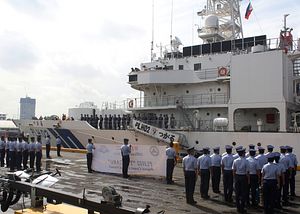Japan and the Philippines will conduct a bilateral exercise this week off of Manila Bay just after an international tribunal is expected to announce a much-anticipated verdict on the Philippines’ South China Sea case against China, Philippine officials confirmed Monday.
The sixth iteration of the Joint Maritime Law Enforcement (MARLEN) Exercise between the Japan Coast Guard (JCG) and the Philippine Coast Guard (PCG) will be conducted on July 13. The exercise focuses on combating piracy and armed robbery at sea and is meant to enhance the capabilities of both sides, facilitate the acquisition of knowledge and skills, and boost mutual understanding between them as well as other law enforcement agencies.
According to a press release by the PCG, during the exercise, delegates of the PCG Maritime Security and Law Enforcement Command together will be present along with other government law enforcement agencies as well as representatives from the United States and Australia, who are participating as observers.
On Monday, the JCG vessel PHG02 Tsugaru, a 105.4-meter crude oil tanker of 3,324 gross tons, arrived and docked in Manila ahead of the exercise. Tsugaru will participate in the exercise along with its assets, which include a helicopter and a rigid hull inflatable board for board, search, and seizure procedures. The PCG will also deploy floating and air assets for the exercise, according to the statement that it released.
The exercise will occur a day after a verdict on Manila’s South China Sea case against Beijing, which was first filed back in 2013 (See: “Does the Philippines’ South China Sea Case Against China Really Matter?”). Even though both sides would claim that the exercises are not directed at China and focus on piracy and armed robbery rather than the South China Sea, their timing will likely feed into media accounts of responses by Beijing and Manila following the ruling.
The Philippines has been boosting its defense partnership with Japan over the past few years, with the two sides inking a landmark deal on equipment and technology earlier this year. This year could see Tokyo begin to deliver equipment to Manila, including patrol vessels as well as surveillance aircraft (See: “Japan, Philippines to Finalize New Military Aircraft Deal for Five TC-90s”). China has traditionally reacted stridently against any sign of Tokyo’s interference in the South China Sea issue as a non-claimant.
































